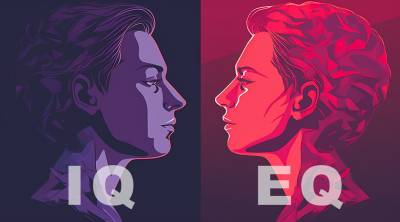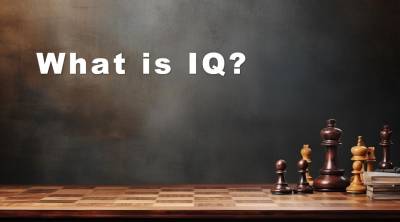Social Intelligence

Social intelligence is an intricate blend of abilities that enables individuals to navigate social situations with finesse and empathy. At its core, it encompasses emotional awareness, effective communication, social perception, and understanding of social dynamics. As psychologist Daniel Goleman once said:
"Social intelligence is the ability to be aware of one's own and others' feelings, to understand the cues and nuances of social interactions, and to adapt one's behavior accordingly."
Social intelligence is a profound construct that encompasses the ability to navigate social interactions with finesse, sensitivity, and effectiveness. It goes beyond cognitive intelligence (check IQ here) and emotional intelligence (EQ) by focusing specifically on the realm of social interactions and interpersonal dynamics. Social intelligence involves a set of skills and competencies that enable individuals to understand, interpret, and respond appropriately to the emotions, intentions, and social cues of others.
Social intelligence components
At its core, social intelligence involves the following components:
-
Emotional Awareness: Socially intelligent individuals possess a high level of emotional awareness, allowing them to recognize and understand their own emotions as well as the emotions of others. This self-awareness helps in perceiving and responding empathetically to the emotional states of those around them.
-
Empathy and Perspective-Taking: Social intelligence involves the ability to empathize with others, stepping into their shoes and understanding their perspectives, thoughts, and feelings. It enables individuals to connect emotionally with others, showing genuine care and consideration.
-
Effective Communication: Socially intelligent individuals are skilled communicators, adept at expressing themselves clearly and assertively while also being attentive and responsive to others. They possess strong verbal and non-verbal communication skills, including active listening, interpreting body language, and adapting their communication style to different contexts.
-
Social Perception: Social intelligence involves the ability to accurately perceive and interpret social cues, non-verbal signals, and contextual information. This skill allows individuals to understand social dynamics, navigate group interactions, and make informed judgments about social situations.
-
Social Influence and Relationship Management: Socially intelligent individuals possess the ability to build and maintain healthy relationships, manage conflicts, and navigate complex social dynamics. They are adept at fostering collaboration, resolving conflicts diplomatically, and building rapport with others.
Understanding social intelligence goes beyond simply being sociable or charming. It involves a deeper level of emotional and interpersonal awareness, facilitating meaningful connections and fostering positive social dynamics.
The Role of Social Intelligence in Interpersonal Relationships
In the realm of personal connections, social intelligence shines as a guiding light. Let's consider empathy, the cornerstone of social intelligence. By empathizing with others' emotions and perspectives, we foster deep understanding and forge meaningful bonds. Picture a friend going through a tough time; your empathetic response, a comforting shoulder to lean on, can be a lifeline of support.
Furthermore, social intelligence equips us with conflict resolution and negotiation skills, allowing us to navigate disagreements with grace and find mutually beneficial resolutions. It promotes active listening, ensuring that we truly hear and understand the needs and concerns of others. These abilities lay the foundation for healthy relationships and help build a network of trust and mutual respect.
| Components of Social Intelligence | Characteristics | Example |
|---|---|---|
| Emotional Awareness | Recognizing and understanding one's own emotions and the emotions of others. | Identifying when a friend is feeling sad or frustrated. |
| Effective Communication | Expressing thoughts and ideas clearly and respectfully, actively listening to others. | Engaging in open and meaningful conversations. |
| Social Perception | Understanding social cues, non-verbal communication, and social dynamics. | Reading body language to gauge the mood of a group. |
| Understanding Social Dynamics | Recognizing the roles, hierarchies, and unwritten rules within social groups. | Adapting behavior in different social settings. |
Social Intelligence in the Workplace
Now, let's shift our focus to the professional realm, where social intelligence emerges as a vital asset. Effective collaboration and teamwork require individuals to harmonize their skills, perspectives, and personalities. By leveraging social intelligence, we can navigate diverse work environments, respect cultural differences, and foster inclusive collaboration.
Leadership, too, flourishes in the realm of social intelligence. Great leaders possess the ability to inspire and influence others, build cohesive teams, and navigate organizational dynamics. As renowned author and leadership expert John C. Maxwell once stated:
"Leadership is not about being in charge. It's about taking care of those in your charge."
Developing Social Intelligence
Like any skill, social intelligence can be nurtured and developed. To enhance emotional awareness, take time for self-reflection and cultivate mindfulness practices. Explore literature and resources on emotional intelligence to deepen your understanding.
Effective communication requires active listening and empathy. Practice listening attentively, allowing others to express themselves fully. Seek feedback and reflect on your communication style to improve your ability to convey thoughts and emotions effectively.
To sharpen social perception, engage in observation exercises, focusing on non-verbal cues and the dynamics of social interactions. Expand your cultural knowledge, appreciating the diversity of social norms and customs.
The Benefits of Social Intelligence
Developing social intelligence yields numerous benefits across personal and professional domains. Strong interpersonal relationships enrich our lives with love, support, and a sense of belonging. In the workplace, social intelligence enhances collaboration, improves leadership effectiveness, and boosts overall job satisfaction. Research suggests that individuals with higher social intelligence tend to experience higher levels of emotional well-being and are better equipped to handle stress and challenges.
Cultural Considerations in Social Intelligence
Cultural sensitivity is a vital aspect of social intelligence. Our globalized world demands an understanding and appreciation of diverse cultural perspectives. By embracing cultural differences, practicing inclusivity, and avoiding stereotypes and biases, we create an environment conducive to open dialogue, respect, and unity.
Social Intelligence in the Digital Age
In today's digital era, social intelligence extends beyond face-to-face interactions. Online platforms provide new avenues for connection and communication. However, they also present challenges, such as interpreting tone and context. To navigate the virtual realm effectively, employ clear and respectful communication, practice digital etiquette, and build authentic connections amidst the digital noise.





